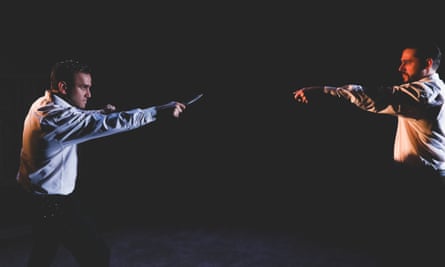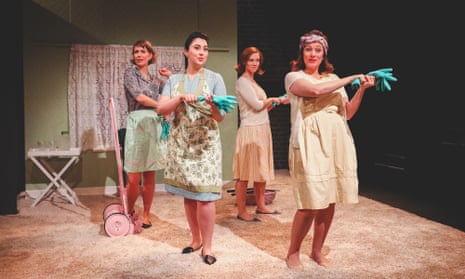Operas don’t always belong to their title characters. Tchaikovsky’s Pushkin–based Eugene Onegin, the latest work to get the OperaUpClose treatment, should really be called Tatyana, because the tragedy is all hers: as the curtain falls on a conventional production, Onegin is finally getting his just desserts, but Tatyana, who has always deserved better, is forever trapped with her steady but boring old husband, who sings one glorious aria but does nothing else.
This, however, is no more of a conventional production than we have come to expect from OperaUpClose. In Robin Norton-Hale’s new English version the husband has been cut, his aria gone with him. There is, of course, no curtain – the singers are metres away. The whole thing is now set in 1960s London suburbia, a generation before Abigail’s Party, all shag-pile carpet and twitching lace curtains – Rosanna Vize’s two-level set may not be pretty but it is effective.

In place of a chorus there is a quartet of women, including Tatyana’s cocktail-mixing mother, who gossip and remember long-shelved dreams, remarking that Tatyana will end up just like them. But she doesn’t: when Onegin returns from his seven years away she is unmarried and hosting not a society ball but the launch party for her new novel. This Tatyana is emancipated, and chooses her Onegin-less fate for herself.
Hurray for Tatyana, you might think. But this isn’t quite the story Tchaikovsky set. How much you think that matters will perhaps depend on what you are expecting. The story as told here, directed by Lucy Bradley, is a good one, delivered by a young cast who ensure we hear every last word of Norton-Hale’s revealing text. Arrogant Onegin and naive Lensky are well sung by Felix Kemp and Anthony Flaum, even if Kemp’s appealing baritone lacks the ideal Onegin velvet; and Lucy Hall’s diamond-bright yet fluid soprano fits this dreamy yet determined Tatyana.
But if the story bends to OperaUpClose’s treatment, Tchaikovsky’s music puts up greater resistance – more so than Mozart’s Magic Flute, which opened earlier this year and which the company will tour alongside Onegin in 2018. Directed from the keyboard by Sonia Ben-Santamaria, Tchaikovsky’s lush, subtly textured score sounds awkward boiled down for only piano, violin, cello and clarinet. All the string tremolos, plus some less-than-lyrical solos make it sound at times like a silent-movie soundtrack. One step away from Tchaikovsky, then – but it’s still an absorbing Onegin.
- At Arcola theatre, London, until 23 December. Box office: 020-7503 1646.

Comments (…)
Sign in or create your Guardian account to join the discussion